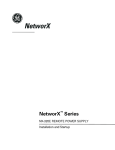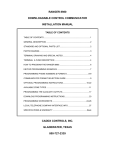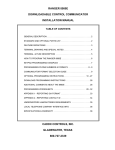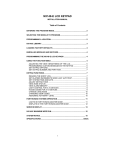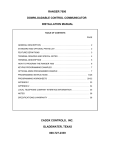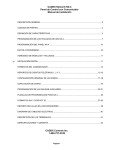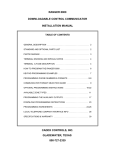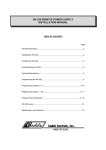Download CADDX NX-416E Specifications
Transcript
NetworX NX Series Receiver Modules NetworX NX Series Receiver Modules Document Number: 466-1427 Rev. E August 1998 1) After mounting the NX-8 cabinet, install the ground plane screws, washers, and nuts (included) in the holes on top of the cabinet (see Figure 1). TOP OF ENCLOSURE 9740G15A.DS4 60-732 Installation Instructions Product Summary The NX-Series Receiver Modules (8-zone NX-408, 16-zone NX-416, and 48-zone NX-448) add wireless capabilities to the Caddx® NetworX NX-8 control panel. Adding a receiver module makes NX-8 control panels compatible with NX wireless transmitters and keychain touchpads (keyfobs). The receiver modules mount inside the NX-8 cabinet and require just three wire connections for power and data communications to the NX-8 motherboard. 9740G05A.DS4 Figure 1. Installing the Ground Plane Screws, Washers, and Nuts 2) Install the circuit board edge guide standoff in the lower mounting hole, in either of the two spaces located just to the left of the NX-8 motherboard (see Figure 2). Do not tighten the standoff at this time. Installation Guidelines Use the following guidelines when installing receiver modules: ■ ■ ■ Leave at least 10" above the control panel for the module’s antennas. Avoid areas that are likely to expose the module to moisture. Avoid areas with excessive metal or electrical wiring, including furnace and utility rooms. Installing the Receiver Module The following steps describe mounting the circuit board edge guide standoff, securing the module to the cabinet, and inserting the antennas. 9740G08A.DS4 CAUTION: You must be free of static electricity before handling circuit boards. Touch a bare metal surface or wear a grounding strap to discharge yourself. Figure 2. Installing the Circuit Board Edge Guide Standoff Page 1 NetworX NX Series Receiver Modules 3) Install the module into the cabinet by turning the standoff sideways, then slide the module up onto the ground plane screw posts (see Figure 3). Wiring, Module Number DIP Switch Settings, and Power Up The following steps describe wiring the module to the NX8, setting the module number DIP switches, and powering up the NX-8. 1) Remove power (if applied) from the NX-8 control panel. CAUTION: To avoid possible equipment damage or personal injury, remove power from the NX-8 control panel before making any wiring connections to the module. 2) Connect the module power and data terminals to the NX-8 power and data terminals using 22-gauge or larger, stranded wire (see Figure 5). POWER + (TO NX-8 AUX PWR +) GND (TO NX-8 COM) DATA (TO NX-8 KP DATA) 9740G04A.DS4 Figure 3. Installing the Module into the Cabinet 9740G14A.DS4 4) 5) Turn the standoff so the slot is facing up, insert the back corner of the module into the standoff slot, then press up at the front of the standoff and tighten the standoff screw. Insert the antennas through the holes on top of the cabinet and into the module antenna sockets (see Figure 4). Figure 5. Wiring the Module Power and Data Terminals to the NX-8 Power and Data Terminals 3) Set the module DIP switches to the desired module number (see Table 1). Table 1. NX Module Number Settings Module Number 32 ON 1 2 EDG 3 4 Module Number 34 ON 1 2 4) 9740G10A.DS4 Figure 4. Inserting the Antennas Page 2 EDG 3 4 Module Number 33 ON 1 2 EDG 3 4 Module Number 35 ON 1 2 EDG 3 4 If using a NX-408 or NX-416, set DIP switch 3 to enable zone blocks for transmitter learning as follows: OFF = zones 9-16 or 9-24 enabled for learning ON = zones 1-8 or 1-16 enabled for learning NetworX NX Series Receiver Modules 5) Apply power to the NX-8. The middle (red) LED on the module should start blinking. Table 2 describes the module’s status based on LED conditions. Table 2. Module Status Conditions LED Module Status Red-blinking Normal data communication with NX-8. Red-off No data communication with NX-8. Check wiring and power source. Green-blinking Receiving radio signals from Learn Mode wireless sensors. Green-off No radio signals currently being received. Note: The red LED at the bottom of the module may emit a dim glow but is not used as an indicator and can be ignored. Special Settings for Door/Window Transmitters and Wireless Smoke Detectors Use the following guidelines when setting features 3 and 4 for door/window transmitters and wireless smoke detectors. ■ Feature 3—Input Option 1 For door/window transmitters, turn on this feature to disable the transmitter’s internal reed switches. For wireless smoke detectors with tamper switches, turn on this feature to enable the tamper feature. Note: ■ Feature 3—Input Option 1, must be off (disabled) when using wireless smoke detectors without tamper switches. Feature 4—Input Option 2 For door/window transmitters that use a normally open external contact, leave this feature off (N/O). For door/window transmitters that use a normally closed external contact, turn this feature on (N/C). Programming This section describes the following programming steps: ■ ■ ■ Determine Programming Settings—provides tables to record wireless transmitter and partition settings. Enroll the Module—sets up the module to be supervised by the NX-8 control panel. Program the Module—puts the module into program so you can program transmitters and enter the settings for transmitters and partitions. Determine Transmitter Settings When programming wireless transmitters into the module, there are various options and partitions you can set for each transmitter. These settings appear in segments of each programming location. Check the desired boxes in the programming worksheet table (Table 3) on pages 4 through 8 to determine the option and partition settings for each transmitter zone. This gives you all the programming information in one place and helps speed up the programming process. Note: The default settings shown for Segments 1 and 2 in Location 1 (Zone 1) apply to all zone locations 1 through 48. Page 3 NetworX NX Series Receiver Modules Table 3. Module Programming Worksheet Table (cont.) Table 3. Module Programming Worksheet Table Location Location Segment 2 0 (Supervision) 1 - Normal ______hrs. (0 - 255 hours; default = 24 hours) Fire ______hrs. (0 - 255 hours; default = 4 hours) 1 (Zone 1) Assigned to module #_____. 1 - Enable sensor ❏ (default = off) 2 - Supervised ❏ (default = on) 3 - Input option 1 ❏ (default = off) 4 - Input option 2 ❏ (default = off) 5 - Xmitter not lost* ❏ (default = off) 6 - Low battery* ❏ (default = off) 7 - Last signal good* ❏ (default = off) 8 - Not used* (*Read only location) Partition 1 keyfob ❏ (default = on) Partition 2 keyfob ❏ (default = off) Partition 3 keyfob ❏ (default = off) Partition 4 keyfob ❏ (default = off) Partition 5 keyfob ❏ (default = off) Partition 6 keyfob ❏ (default = off) Partition 7 keyfob ❏ (default = off) Partition 8 keyfob ❏ (default = off) 1 - Enable sensor ❏ 2 - Supervised ❏ 3 - Input option 1 ❏ 4 - Input option 2 ❏ 5 - Xmitter not lost* ❏ 6 - Low battery* ❏ 7 - Last signal good* ❏ 8 - Not used* (*Read only location) Partition 1 keyfob ❏ Partition 2 keyfob ❏ Partition 3 keyfob ❏ Partition 4 keyfob ❏ Partition 5 keyfob ❏ Partition 6 keyfob ❏ Partition 7 keyfob ❏ Partition 8 keyfob ❏ 1 - Enable sensor ❏ 2 - Supervised ❏ 3 - Input option 1 ❏ 4 - Input option 2 ❏ 5 - Xmitter not lost* ❏ 6 - Low battery* ❏ 7 - Last signal good* ❏ 8 - Not used* (*Read only location) Partition 1 keyfob ❏ Partition 2 keyfob ❏ Partition 3 keyfob ❏ Partition 4 keyfob ❏ Partition 5 keyfob ❏ Partition 6 keyfob ❏ Partition 7 keyfob ❏ Partition 8 keyfob ❏ 1 - Enable sensor ❏ 2 - Supervised ❏ 3 - Input option 1 ❏ 4 - Input option 2 ❏ 5 - Xmitter not lost* ❏ 6 - Low battery* ❏ 7 - Last signal good* ❏ 8 - Not used* (*Read only location) Partition 1 keyfob ❏ Partition 2 keyfob ❏ Partition 3 keyfob ❏ Partition 4 keyfob ❏ Partition 5 keyfob ❏ Partition 6 keyfob ❏ Partition 7 keyfob ❏ Partition 8 keyfob ❏ 2 (Zone 2) Assigned to module #_____. 3 (Zone 3) Assigned to module #_____. 4 (Zone 4) Assigned to module #_____. Page 4 Segment 1 Segment 1 Segment 2 5 (Zone 5) Assigned to module #_____. 1 - Enable sensor ❏ 2 - Supervised ❏ 3 - Input option 1 ❏ 4 - Input option 2 ❏ 5 - Xmitter not lost* ❏ 6 - Low battery* ❏ 7 - Last signal good* ❏ 8 - Not used* (*Read only location) Partition 1 keyfob ❏ Partition 2 keyfob ❏ Partition 3 keyfob ❏ Partition 4 keyfob ❏ Partition 5 keyfob ❏ Partition 6 keyfob ❏ Partition 7 keyfob ❏ Partition 8 keyfob ❏ 6 (Zone 6) Assigned to module #_____. 1 - Enable sensor ❏ 2 - Supervised ❏ 3 - Input option 1 ❏ 4 - Input option 2 ❏ 5 - Xmitter not lost* ❏ 6 - Low battery* ❏ 7 - Last signal good* ❏ 8 - Not used* (*Read only location) Partition 1 keyfob ❏ Partition 2 keyfob ❏ Partition 3 keyfob ❏ Partition 4 keyfob ❏ Partition 5 keyfob ❏ Partition 6 keyfob ❏ Partition 7 keyfob ❏ Partition 8 keyfob ❏ 7 (Zone 7) Assigned to module #_____. 1 - Enable sensor ❏ 2 - Supervised ❏ 3 - Input option 1 ❏ 4 - Input option 2 ❏ 5 - Xmitter not lost* ❏ 6 - Low battery* ❏ 7 - Last signal good* ❏ 8 - Not used* (*Read only location) Partition 1 keyfob ❏ Partition 2 keyfob ❏ Partition 3 keyfob ❏ Partition 4 keyfob ❏ Partition 5 keyfob ❏ Partition 6 keyfob ❏ Partition 7 keyfob ❏ Partition 8 keyfob ❏ 8 (Zone 8) Assigned to module #_____. 1 - Enable sensor ❏ 2 - Supervised ❏ 3 - Input option 1 ❏ 4 - Input option 2 ❏ 5 - Xmitter not lost* ❏ 6 - Low battery* ❏ 7 - Last signal good* ❏ 8 - Not used* (*Read only location) Partition 1 keyfob ❏ Partition 2 keyfob ❏ Partition 3 keyfob ❏ Partition 4 keyfob ❏ Partition 5 keyfob ❏ Partition 6 keyfob ❏ Partition 7 keyfob ❏ Partition 8 keyfob ❏ 9 (Zone 9) Assigned to module #_____. 1 - Enable sensor ❏ 2 - Supervised ❏ 3 - Input option 1 ❏ 4 - Input option 2 ❏ 5 - Xmitter not lost* ❏ 6 - Low battery* ❏ 7 - Last signal good* ❏ 8 - Not used* (*Read only location) Partition 1 keyfob ❏ Partition 2 keyfob ❏ Partition 3 keyfob ❏ Partition 4 keyfob ❏ Partition 5 keyfob ❏ Partition 6 keyfob ❏ Partition 7 keyfob ❏ Partition 8 keyfob ❏ NetworX NX Series Receiver Modules Table 3. Module Programming Worksheet Table (cont.) Table 3. Module Programming Worksheet Table (cont.) Location Segment 1 Segment 2 Location Segment 1 Segment 2 10 (Zone 10) Assigned to module #_____. 1 - Enable sensor ❏ 2 - Supervised ❏ 3 - Input option 1 ❏ 4 - Input option 2 ❏ 5 - Xmitter not lost* ❏ 6 - Low battery* ❏ 7 - Last signal good* ❏ 8 - Not used* (*Read only location) Partition 1 keyfob ❏ Partition 2 keyfob ❏ Partition 3 keyfob ❏ Partition 4 keyfob ❏ Partition 5 keyfob ❏ Partition 6 keyfob ❏ Partition 7 keyfob ❏ Partition 8 keyfob ❏ 15 (Zone 15) Assigned to module #_____. 1 - Enable sensor ❏ 2 - Supervised ❏ 3 - Input option 1 ❏ 4 - Input option 2 ❏ 5 - Xmitter not lost* ❏ 6 - Low battery* ❏ 7 - Last signal good* ❏ 8 - Not used* (*Read only location) Partition 1 keyfob ❏ Partition 2 keyfob ❏ Partition 3 keyfob ❏ Partition 4 keyfob ❏ Partition 5 keyfob ❏ Partition 6 keyfob ❏ Partition 7 keyfob ❏ Partition 8 keyfob ❏ 11 (Zone 11) Assigned to module #_____. 1 - Enable sensor ❏ 2 - Supervised ❏ 3 - Input option 1 ❏ 4 - Input option 2 ❏ 5 - Xmitter not lost* ❏ 6 - Low battery* ❏ 7 - Last signal good* ❏ 8 - Not used* (*Read only location) Partition 1 keyfob ❏ Partition 2 keyfob ❏ Partition 3 keyfob ❏ Partition 4 keyfob ❏ Partition 5 keyfob ❏ Partition 6 keyfob ❏ Partition 7 keyfob ❏ Partition 8 keyfob ❏ 16 (Zone 16) Assigned to module #_____. 1 - Enable sensor ❏ 2 - Supervised ❏ 3 - Input option 1 ❏ 4 - Input option 2 ❏ 5 - Xmitter not lost* ❏ 6 - Low battery* ❏ 7 - Last signal good* ❏ 8 - Not used* (*Read only location) Partition 1 keyfob ❏ Partition 2 keyfob ❏ Partition 3 keyfob ❏ Partition 4 keyfob ❏ Partition 5 keyfob ❏ Partition 6 keyfob ❏ Partition 7 keyfob ❏ Partition 8 keyfob ❏ 12 (Zone 12) Assigned to module #_____. 1 - Enable sensor ❏ 2 - Supervised ❏ 3 - Input option 1 ❏ 4 - Input option 2 ❏ 5 - Xmitter not lost* ❏ 6 - Low battery* ❏ 7 - Last signal good* ❏ 8 - Not used* (*Read only location) Partition 1 keyfob ❏ Partition 2 keyfob ❏ Partition 3 keyfob ❏ Partition 4 keyfob ❏ Partition 5 keyfob ❏ Partition 6 keyfob ❏ Partition 7 keyfob ❏ Partition 8 keyfob ❏ 17 (Zone 17) Assigned to module #_____. 1 - Enable sensor ❏ 2 - Supervised ❏ 3 - Input option 1 ❏ 4 - Input option 2 ❏ 5 - Xmitter not lost* ❏ 6 - Low battery* ❏ 7 - Last signal good* ❏ 8 - Not used* (*Read only location) Partition 1 keyfob ❏ Partition 2 keyfob ❏ Partition 3 keyfob ❏ Partition 4 keyfob ❏ Partition 5 keyfob ❏ Partition 6 keyfob ❏ Partition 7 keyfob ❏ Partition 8 keyfob ❏ 13 (Zone 13) Assigned to module #_____. 1 - Enable sensor ❏ 2 - Supervised ❏ 3 - Input option 1 ❏ 4 - Input option 2 ❏ 5 - Xmitter not lost* ❏ 6 - Low battery* ❏ 7 - Last signal good* ❏ 8 - Not used* (*Read only location) Partition 1 keyfob ❏ Partition 2 keyfob ❏ Partition 3 keyfob ❏ Partition 4 keyfob ❏ Partition 5 keyfob ❏ Partition 6 keyfob ❏ Partition 7 keyfob ❏ Partition 8 keyfob ❏ 18 (Zone 18) Assigned to module #_____. 1 - Enable sensor ❏ 2 - Supervised ❏ 3 - Input option 1 ❏ 4 - Input option 2 ❏ 5 - Xmitter not lost* ❏ 6 - Low battery* ❏ 7 - Last signal good* ❏ 8 - Not used* (*Read only location) Partition 1 keyfob ❏ Partition 2 keyfob ❏ Partition 3 keyfob ❏ Partition 4 keyfob ❏ Partition 5 keyfob ❏ Partition 6 keyfob ❏ Partition 7 keyfob ❏ Partition 8 keyfob ❏ 14 (Zone 14) Assigned to module #_____. 1 - Enable sensor ❏ 2 - Supervised ❏ 3 - Input option 1 ❏ 4 - Input option 2 ❏ 5 - Xmitter not lost* ❏ 6 - Low battery* ❏ 7 - Last signal good* ❏ 8 - Not used* (*Read only location) Partition 1 keyfob ❏ Partition 2 keyfob ❏ Partition 3 keyfob ❏ Partition 4 keyfob ❏ Partition 5 keyfob ❏ Partition 6 keyfob ❏ Partition 7 keyfob ❏ Partition 8 keyfob ❏ 19 (Zone 19) Assigned to module #_____. 1 - Enable sensor ❏ 2 - Supervised ❏ 3 - Input option 1 ❏ 4 - Input option 2 ❏ 5 - Xmitter not lost* ❏ 6 - Low battery* ❏ 7 - Last signal good* ❏ 8 - Not used* (*Read only location) Partition 1 keyfob ❏ Partition 2 keyfob ❏ Partition 3 keyfob ❏ Partition 4 keyfob ❏ Partition 5 keyfob ❏ Partition 6 keyfob ❏ Partition 7 keyfob ❏ Partition 8 keyfob ❏ Page 5 NetworX NX Series Receiver Modules Table 3. Module Programming Worksheet Table (cont.) Page 6 Table 3. Module Programming Worksheet Table (cont.) Location Segment 1 Segment 2 Location Segment 1 Segment 2 20 (Zone 20) Assigned to module #_____. 1 - Enable sensor ❏ 2 - Supervised ❏ 3 - Input option 1 ❏ 4 - Input option 2 ❏ 5 - Xmitter not lost* ❏ 6 - Low battery* ❏ 7 - Last signal good* ❏ 8 - Not used* (*Read only location) Partition 1 keyfob ❏ Partition 2 keyfob ❏ Partition 3 keyfob ❏ Partition 4 keyfob ❏ Partition 5 keyfob ❏ Partition 6 keyfob ❏ Partition 7 keyfob ❏ Partition 8 keyfob ❏ 25 (Zone 25) Assigned to module #_____. 1 - Enable sensor ❏ 2 - Supervised ❏ 3 - Input option 1 ❏ 4 - Input option 2 ❏ 5 - Xmitter not lost* ❏ 6 - Low battery* ❏ 7 - Last signal good* ❏ 8 - Not used* (*Read only location) Partition 1 keyfob ❏ Partition 2 keyfob ❏ Partition 3 keyfob ❏ Partition 4 keyfob ❏ Partition 5 keyfob ❏ Partition 6 keyfob ❏ Partition 7 keyfob ❏ Partition 8 keyfob ❏ 21 (Zone 21) Assigned to module #_____. 1 - Enable sensor ❏ 2 - Supervised ❏ 3 - Input option 1 ❏ 4 - Input option 2 ❏ 5 - Xmitter not lost* ❏ 6 - Low battery* ❏ 7 - Last signal good* ❏ 8 - Not used* (*Read only location) Partition 1 keyfob ❏ Partition 2 keyfob ❏ Partition 3 keyfob ❏ Partition 4 keyfob ❏ Partition 5 keyfob ❏ Partition 6 keyfob ❏ Partition 7 keyfob ❏ Partition 8 keyfob ❏ 26 (Zone 26) Assigned to module #_____. 1 - Enable sensor ❏ 2 - Supervised ❏ 3 - Input option 1 ❏ 4 - Input option 2 ❏ 5 - Xmitter not lost* ❏ 6 - Low battery* ❏ 7 - Last signal good* ❏ 8 - Not used* (*Read only location) Partition 1 keyfob ❏ Partition 2 keyfob ❏ Partition 3 keyfob ❏ Partition 4 keyfob ❏ Partition 5 keyfob ❏ Partition 6 keyfob ❏ Partition 7 keyfob ❏ Partition 8 keyfob ❏ 22 (Zone 22) Assigned to module #_____. 1 - Enable sensor ❏ 2 - Supervised ❏ 3 - Input option 1 ❏ 4 - Input option 2 ❏ 5 - Xmitter not lost* ❏ 6 - Low battery* ❏ 7 - Last signal good* ❏ 8 - Not used* (*Read only location) Partition 1 keyfob ❏ Partition 2 keyfob ❏ Partition 3 keyfob ❏ Partition 4 keyfob ❏ Partition 5 keyfob ❏ Partition 6 keyfob ❏ Partition 7 keyfob ❏ Partition 8 keyfob ❏ 27 (Zone 27) Assigned to module #_____. 1 - Enable sensor ❏ 2 - Supervised ❏ 3 - Input option 1 ❏ 4 - Input option 2 ❏ 5 - Xmitter not lost* ❏ 6 - Low battery* ❏ 7 - Last signal good* ❏ 8 - Not used* (*Read only location) Partition 1 keyfob ❏ Partition 2 keyfob ❏ Partition 3 keyfob ❏ Partition 4 keyfob ❏ Partition 5 keyfob ❏ Partition 6 keyfob ❏ Partition 7 keyfob ❏ Partition 8 keyfob ❏ 23 (Zone 23) Assigned to module #_____. 1 - Enable sensor ❏ 2 - Supervised ❏ 3 - Input option 1 ❏ 4 - Input option 2 ❏ 5 - Xmitter not lost* ❏ 6 - Low battery* ❏ 7 - Last signal good* ❏ 8 - Not used* (*Read only location) Partition 1 keyfob ❏ Partition 2 keyfob ❏ Partition 3 keyfob ❏ Partition 4 keyfob ❏ Partition 5 keyfob ❏ Partition 6 keyfob ❏ Partition 7 keyfob ❏ Partition 8 keyfob ❏ 28 (Zone 28) Assigned to module #_____. 1 - Enable sensor ❏ 2 - Supervised ❏ 3 - Input option 1 ❏ 4 - Input option 2 ❏ 5 - Xmitter not lost* ❏ 6 - Low battery* ❏ 7 - Last signal good* ❏ 8 - Not used* (*Read only location) Partition 1 keyfob ❏ Partition 2 keyfob ❏ Partition 3 keyfob ❏ Partition 4 keyfob ❏ Partition 5 keyfob ❏ Partition 6 keyfob ❏ Partition 7 keyfob ❏ Partition 8 keyfob ❏ 24 (Zone 24) Assigned to module #_____. 1 - Enable sensor ❏ 2 - Supervised ❏ 3 - Input option 1 ❏ 4 - Input option 2 ❏ 5 - Xmitter not lost* ❏ 6 - Low battery* ❏ 7 - Last signal good* ❏ 8 - Not used* (*Read only location) Partition 1 keyfob ❏ Partition 2 keyfob ❏ Partition 3 keyfob ❏ Partition 4 keyfob ❏ Partition 5 keyfob ❏ Partition 6 keyfob ❏ Partition 7 keyfob ❏ Partition 8 keyfob ❏ 29 (Zone 29) Assigned to module #_____. 1 - Enable sensor ❏ 2 - Supervised ❏ 3 - Input option 1 ❏ 4 - Input option 2 ❏ 5 - Xmitter not lost* ❏ 6 - Low battery* ❏ 7 - Last signal good* ❏ 8 - Not used* (*Read only location) Partition 1 keyfob ❏ Partition 2 keyfob ❏ Partition 3 keyfob ❏ Partition 4 keyfob ❏ Partition 5 keyfob ❏ Partition 6 keyfob ❏ Partition 7 keyfob ❏ Partition 8 keyfob ❏ NetworX NX Series Receiver Modules Table 3. Module Programming Worksheet Table (cont.) Table 3. Module Programming Worksheet Table (cont.) Location Segment 1 Segment 2 Location Segment 1 Segment 2 30 (Zone 30) Assigned to module #_____. 1 - Enable sensor ❏ 2 - Supervised ❏ 3 - Input option 1 ❏ 4 - Input option 2 ❏ 5 - Xmitter not lost* ❏ 6 - Low battery* ❏ 7 - Last signal good* ❏ 8 - Not used* (*Read only location) Partition 1 keyfob ❏ Partition 2 keyfob ❏ Partition 3 keyfob ❏ Partition 4 keyfob ❏ Partition 5 keyfob ❏ Partition 6 keyfob ❏ Partition 7 keyfob ❏ Partition 8 keyfob ❏ 35 (Zone 35) Assigned to module #_____. 1 - Enable sensor ❏ 2 - Supervised ❏ 3 - Input option 1 ❏ 4 - Input option 2 ❏ 5 - Xmitter not lost* ❏ 6 - Low battery* ❏ 7 - Last signal good* ❏ 8 - Not used* (*Read only location) Partition 1 keyfob ❏ Partition 2 keyfob ❏ Partition 3 keyfob ❏ Partition 4 keyfob ❏ Partition 5 keyfob ❏ Partition 6 keyfob ❏ Partition 7 keyfob ❏ Partition 8 keyfob ❏ 31 (Zone 31) Assigned to module #_____. 1 - Enable sensor ❏ 2 - Supervised ❏ 3 - Input option 1 ❏ 4 - Input option 2 ❏ 5 - Xmitter not lost* ❏ 6 - Low battery* ❏ 7 - Last signal good* ❏ 8 - Not used* (*Read only location) Partition 1 keyfob ❏ Partition 2 keyfob ❏ Partition 3 keyfob ❏ Partition 4 keyfob ❏ Partition 5 keyfob ❏ Partition 6 keyfob ❏ Partition 7 keyfob ❏ Partition 8 keyfob ❏ 36 (Zone 36) Assigned to module #_____. 1 - Enable sensor ❏ 2 - Supervised ❏ 3 - Input option 1 ❏ 4 - Input option 2 ❏ 5 - Xmitter not lost* ❏ 6 - Low battery* ❏ 7 - Last signal good* ❏ 8 - Not used* (*Read only location) Partition 1 keyfob ❏ Partition 2 keyfob ❏ Partition 3 keyfob ❏ Partition 4 keyfob ❏ Partition 5 keyfob ❏ Partition 6 keyfob ❏ Partition 7 keyfob ❏ Partition 8 keyfob ❏ 32 (Zone 32) Assigned to module #_____. 1 - Enable sensor ❏ 2 - Supervised ❏ 3 - Input option 1 ❏ 4 - Input option 2 ❏ 5 - Xmitter not lost* ❏ 6 - Low battery* ❏ 7 - Last signal good* ❏ 8 - Not used* (*Read only location) Partition 1 keyfob ❏ Partition 2 keyfob ❏ Partition 3 keyfob ❏ Partition 4 keyfob ❏ Partition 5 keyfob ❏ Partition 6 keyfob ❏ Partition 7 keyfob ❏ Partition 8 keyfob ❏ 37 (Zone 37) Assigned to module #_____. 1 - Enable sensor ❏ 2 - Supervised ❏ 3 - Input option 1 ❏ 4 - Input option 2 ❏ 5 - Xmitter not lost* ❏ 6 - Low battery* ❏ 7 - Last signal good* ❏ 8 - Not used* (*Read only location) Partition 1 keyfob ❏ Partition 2 keyfob ❏ Partition 3 keyfob ❏ Partition 4 keyfob ❏ Partition 5 keyfob ❏ Partition 6 keyfob ❏ Partition 7 keyfob ❏ Partition 8 keyfob ❏ 33 (Zone 33) Assigned to module #_____. 1 - Enable sensor ❏ 2 - Supervised ❏ 3 - Input option 1 ❏ 4 - Input option 2 ❏ 5 - Xmitter not lost* ❏ 6 - Low battery* ❏ 7 - Last signal good* ❏ 8 - Not used* (*Read only location) Partition 1 keyfob ❏ Partition 2 keyfob ❏ Partition 3 keyfob ❏ Partition 4 keyfob ❏ Partition 5 keyfob ❏ Partition 6 keyfob ❏ Partition 7 keyfob ❏ Partition 8 keyfob ❏ 38 (Zone 38) Assigned to module #_____. 1 - Enable sensor ❏ 2 - Supervised ❏ 3 - Input option 1 ❏ 4 - Input option 2 ❏ 5 - Xmitter not lost* ❏ 6 - Low battery* ❏ 7 - Last signal good* ❏ 8 - Not used* (*Read only location) Partition 1 keyfob ❏ Partition 2 keyfob ❏ Partition 3 keyfob ❏ Partition 4 keyfob ❏ Partition 5 keyfob ❏ Partition 6 keyfob ❏ Partition 7 keyfob ❏ Partition 8 keyfob ❏ 34 (Zone 34) Assigned to module #_____. 1 - Enable sensor ❏ 2 - Supervised ❏ 3 - Input option 1 ❏ 4 - Input option 2 ❏ 5 - Xmitter not lost* ❏ 6 - Low battery* ❏ 7 - Last signal good* ❏ 8 - Not used* (*Read only location) Partition 1 keyfob ❏ Partition 2 keyfob ❏ Partition 3 keyfob ❏ Partition 4 keyfob ❏ Partition 5 keyfob ❏ Partition 6 keyfob ❏ Partition 7 keyfob ❏ Partition 8 keyfob ❏ 39 (Zone 39) Assigned to module #_____. 1 - Enable sensor ❏ 2 - Supervised ❏ 3 - Input option 1 ❏ 4 - Input option 2 ❏ 5 - Xmitter not lost* ❏ 6 - Low battery* ❏ 7 - Last signal good* ❏ 8 - Not used* (*Read only location) Partition 1 keyfob ❏ Partition 2 keyfob ❏ Partition 3 keyfob ❏ Partition 4 keyfob ❏ Partition 5 keyfob ❏ Partition 6 keyfob ❏ Partition 7 keyfob ❏ Partition 8 keyfob ❏ Page 7 NetworX NX Series Receiver Modules Table 3. Module Programming Worksheet Table (cont.) Page 8 Table 3. Module Programming Worksheet Table (cont.) Location Segment 1 Segment 2 Location Segment 1 Segment 2 40 (Zone 40) Assigned to module #_____. 1 - Enable sensor ❏ 2 - Supervised ❏ 3 - Input option 1 ❏ 4 - Input option 2 ❏ 5 - Xmitter not lost* ❏ 6 - Low battery* ❏ 7 - Last signal good* ❏ 8 - Not used* (*Read only location) Partition 1 keyfob ❏ Partition 2 keyfob ❏ Partition 3 keyfob ❏ Partition 4 keyfob ❏ Partition 5 keyfob ❏ Partition 6 keyfob ❏ Partition 7 keyfob ❏ Partition 8 keyfob ❏ 45 (Zone 45) Assigned to module #_____. 1 - Enable sensor ❏ 2 - Supervised ❏ 3 - Input option 1 ❏ 4 - Input option 2 ❏ 5 - Xmitter not lost* ❏ 6 - Low battery* ❏ 7 - Last signal good* ❏ 8 - Not used* (*Read only location) Partition 1 keyfob ❏ Partition 2 keyfob ❏ Partition 3 keyfob ❏ Partition 4 keyfob ❏ Partition 5 keyfob ❏ Partition 6 keyfob ❏ Partition 7 keyfob ❏ Partition 8 keyfob ❏ 41 (Zone 41) Assigned to module #_____. 1 - Enable sensor ❏ 2 - Supervised ❏ 3 - Input option 1 ❏ 4 - Input option 2 ❏ 5 - Xmitter not lost* ❏ 6 - Low battery* ❏ 7 - Last signal good* ❏ 8 - Not used* (*Read only location) Partition 1 keyfob ❏ Partition 2 keyfob ❏ Partition 3 keyfob ❏ Partition 4 keyfob ❏ Partition 5 keyfob ❏ Partition 6 keyfob ❏ Partition 7 keyfob ❏ Partition 8 keyfob ❏ 46 (Zone 46) Assigned to module #_____. 1 - Enable sensor ❏ 2 - Supervised ❏ 3 - Input option 1 ❏ 4 - Input option 2 ❏ 5 - Xmitter not lost* ❏ 6 - Low battery* ❏ 7 - Last signal good* ❏ 8 - Not used* (*Read only location) Partition 1 keyfob ❏ Partition 2 keyfob ❏ Partition 3 keyfob ❏ Partition 4 keyfob ❏ Partition 5 keyfob ❏ Partition 6 keyfob ❏ Partition 7 keyfob ❏ Partition 8 keyfob ❏ 42 (Zone 42) Assigned to module #_____. 1 - Enable sensor ❏ 2 - Supervised ❏ 3 - Input option 1 ❏ 4 - Input option 2 ❏ 5 - Xmitter not lost* ❏ 6 - Low battery* ❏ 7 - Last signal good* ❏ 8 - Not used* (*Read only location) Partition 1 keyfob ❏ Partition 2 keyfob ❏ Partition 3 keyfob ❏ Partition 4 keyfob ❏ Partition 5 keyfob ❏ Partition 6 keyfob ❏ Partition 7 keyfob ❏ Partition 8 keyfob ❏ 47 (Zone 47) Assigned to module #_____. 1 - Enable sensor ❏ 2 - Supervised ❏ 3 - Input option 1 ❏ 4 - Input option 2 ❏ 5 - Xmitter not lost* ❏ 6 - Low battery* ❏ 7 - Last signal good* ❏ 8 - Not used* (*Read only location) Partition 1 keyfob ❏ Partition 2 keyfob ❏ Partition 3 keyfob ❏ Partition 4 keyfob ❏ Partition 5 keyfob ❏ Partition 6 keyfob ❏ Partition 7 keyfob ❏ Partition 8 keyfob ❏ 43 (Zone 43) Assigned to module #_____. 1 - Enable sensor ❏ 2 - Supervised ❏ 3 - Input option 1 ❏ 4 - Input option 2 ❏ 5 - Xmitter not lost* ❏ 6 - Low battery* ❏ 7 - Last signal good* ❏ 8 - Not used* (*Read only location) Partition 1 keyfob ❏ Partition 2 keyfob ❏ Partition 3 keyfob ❏ Partition 4 keyfob ❏ Partition 5 keyfob ❏ Partition 6 keyfob ❏ Partition 7 keyfob ❏ Partition 8 keyfob ❏ 48 (Zone 48) Assigned to module #_____. 1 - Enable sensor ❏ 2 - Supervised ❏ 3 - Input option 1 ❏ 4 - Input option 2 ❏ 5 - Xmitter not lost* ❏ 6 - Low battery* ❏ 7 - Last signal good* ❏ 8 - Not used* (*Read only location) Partition 1 keyfob ❏ Partition 2 keyfob ❏ Partition 3 keyfob ❏ Partition 4 keyfob ❏ Partition 5 keyfob ❏ Partition 6 keyfob ❏ Partition 7 keyfob ❏ Partition 8 keyfob ❏ 44 (Zone 44) Assigned to module #_____. 1 - Enable sensor ❏ 2 - Supervised ❏ 3 - Input option 1 ❏ 4 - Input option 2 ❏ 5 - Xmitter not lost* ❏ 6 - Low battery* ❏ 7 - Last signal good* ❏ 8 - Not used* (*Read only location) Partition 1 keyfob ❏ Partition 2 keyfob ❏ Partition 3 keyfob ❏ Partition 4 keyfob ❏ Partition 5 keyfob ❏ Partition 6 keyfob ❏ Partition 7 keyfob ❏ Partition 8 keyfob ❏ 49 (Transmitter to be programmed) None None NetworX NX Series Receiver Modules trol panel is enrolling the module. After about 12 seconds, the service LED should turn off. Table 3. Module Programming Worksheet Table (cont.) Location 50 (All default off) 51 (Default = 0) Segment 1 Segment 2 1 - Keyfob user ID ❏ (off = all keyfobs report as user 99; on = keyfob reports as its learned zone) 2 - Enable jam detect ❏ 3 - Enable antenna tamper (Only selectable on International versions, reports as box tamper) ❏ 4 - Enable auto advance to next zone number ❏ 5 - Enable partition 1 audible programming beeps ❏ 6-8 Not used Starting zone number for receiver 0 = 1* (default) ❏ 1=9❏ 2 = 17 ❏ 3 = 25 ❏ 4 = 33 ❏ 5 = 41 ❏ (* When set to 0, the starting zone number is determined by DIP switch 3 setting.) Enroll the Module The following steps describe how to enroll and program the module to be supervised by the NX-8. 1) 2) 3) 4) 5) With power applied and the system disarmed, enter [✻] [8] at the keypad. The five function lights should start flashing. Enter the “Go To Program Code” (factory default is 9 7 1 3). The service light should flash and the five function lights should change from flashing to on steady. Enter [0] [#], where [0] is the NX-8 control panel number and [#] is the entry key. The Armed LED should turn on, indicating the control panel is waiting for a programming location entry. Enter [9] [1] [5] [#] to enroll the module for supervision. The keypad sounder should beep three times indicating the NX-8 has accepted the enrolling request. Exit program mode by entering [EXIT] [EXIT]. The Service LED on the NX-8 turns on, indicating the con- Program the Module The following steps describe how to get the module into program mode, load factory defaults if installing a new system, and program transmitters into memory. Programming Guidelines ■ ■ ■ When a transmitter is learned into memory, the module claims a block of eight zones around that number (1-8, 9-16, 17-24, etc.). For example, learning a transmitter into zone 13 automatically claims the zone block of 9 through 16. Only wireless transmitters can now be assigned to these zones. Do not learn wireless transmitters into a zone block claimed by a hardwire expander or the panel. If two modules are installed, they cannot share the same zone block. For example, wireless transmitters learned into zones 11 and 12 must reside in one module. Fill in Table 4 to help keep track of zone block module assignments. Be sure to circle the module type; RM = receiver module, HE = hardwire expander, P = panel. Table 4. Zone Block Module Assignments Zone Block Assigned To Module 1-8 RM HE P #______ 9 - 16 RM HE P #______ 17 - 24 RM HE P #______ 25 - 32 RM HE P #______ 33 - 40 RM HE P #______ 41 - 48 RM HE P #______ To program the module: 1) 2) 3) 4) Enter [✻] [8] at the keypad. The five function lights should start flashing. Enter the “Go To Program Code” (factory default is 9 7 1 3). The service light should flash and the five function lights should change from flashing to on steady. Enter [XX] [#], where [XX] is the DIP switch setting module number and [#] is the entry key. The Armed LED should turn on, indicating the control panel is waiting for a programming location entry. For new installations, enter [9] [1] [0] [#] to load factory defaults and clear any unwanted information in memory before any further programming. Page 9 NetworX NX Series Receiver Modules 5) 6) Enter [4] [9] [#] to enter the sensor learning location. The Ready LED should turn on and the Armed LED should turn off. Enter [XX] [✻], where [XX] is a zone number (1 through 48) and [✻] is the entry key. Note: Three beeps from the keypad indicates an entry error. This occurs if you enter a transmitter number that is not within the module’s zone block or if you try learning a sensor that is already learned into the module. If you change your mind about your entry, you can terminate programming by entering [4] [9] [#] [0] [✻]. Then, start again from step 5. 7) Trip the desired transmitter (within 250 seconds) as described in Table 5. Listen for the ‘ding dong’ for confirmation. Table 5. Tripping Transmitters for Learning Transmitter Action Door/Window, Shock, Glass Guard, Freeze Activate tamper switch by removing cover. Door/Window with External Contact Activate tamper switch by removing cover. (Note: Feature 3—Input Option 1, must be on.) Recessed Door/Window Activate tamper switch by removing circuit board until tamper switch is exposed. Micro Door/Window Slide the battery about half-way out of the battery holder, then back. PIR Activate tamper switch by removing back plate from PIR. Smoke Detector Press and hold the test button. Heat Detector Press, then release the tamper switch. Fire Pull Activate tamper switch by removing sensor cover. Single Button Panic Press and hold the button. Dual Button Panic Press and hold both buttons together. Table 5. Tripping Transmitters for Learning Transmitter Keyfobs Press and hold the arm and disarm buttons together. Repeater Press, then release the tamper switch. 8) 9) Program remaining transmitters by repeating steps 5-7. Exit program mode by entering [EXIT] [EXIT]. Program Transmitter and Partition Settings This section describes programming guidelines, how to change the supervision windows, and program the transmitter and partition settings using the information you entered in the Table 3 programming worksheets. Changing the Transmitter Supervision Windows Note: For UL Listed installations, the normal supervision window must be set to 24 hours and the fire supervision window must be set to 4 hours. CAUTION: Do not set the normal or fire supervision windows to 1 hour. This causes false trouble reports from all learned wireless transmitters. 1) 2) 3) 4) 5) Enter [✻] [8] at the keypad. The five function lights should start flashing. Enter the “Go To Program Code” (factory default is 9 7 1 3). The service light should flash and the five function lights should change from flashing to on steady. Enter [XX] [#], where [XX] is the DIP switch setting module number and [#] is the entry key. The Armed LED should turn on, indicating the control panel is waiting for a programming location entry. Enter [0] [#] to enter location 0, segment 1. Enter the new normal supervision time (0 - 255). Note: 6) 7) Choosing 0 sets the normal supervision window to 256 hours. Press [✻] to save any changes and automatically enter segment 2. Enter the new fire supervision time (0 - 255). Note: Page 10 Action Choosing 0 sets the fire supervision window to 256 hours. NetworX NX Series Receiver Modules 8) Press [✻] to save any changes. The panel is now waiting for the next location entry. Note: 9) Pressing [#] does not save changes to the current segment, but does save changes made in previous segments. Enter [EXIT] [EXIT] when all changes are completed. Programming Transmitter and Partition Settings 1) Enter [✻] [8] at the keypad. The five function lights should start flashing. 2) Enter the “Go To Program Code” (factory default is 9 7 1 3). The service light should flash and the five function lights should change from flashing to on steady. 3) Enter [XX] [#], where [XX] is the DIP switch setting module number and [#] is the entry key. The Armed LED should turn on, indicating the control panel is waiting for a programming location entry. 4) Enter [XX] [#] to enter a location. For example, enter [1] [#] to enter location 1, segment 1. The Armed LED should turn on and the zone LEDs display the binary data for the current settings. or-- Enter [1] [#] [✻] to enter location 1, segment 2. 5) Enter [X] [✻], where [X] is the setting number (1 - 8) from Table 5 that corresponds to the desired feature or partition setting number and [✻] is the entry key. The keypad displays the settings for that location and segment. 6) Press the keypad button that corresponds to the feature number you want changed. Lights corresponding to the feature number turn on or off each time the button is pressed. Lights that turn on indicate the feature is on, lights that turn off indicate the feature is off. For example, turn on transmitter features 1 (Transmitter Enabled) and 3 (Input Option 1) by pressing [1] [3]. The 1 and 3 LEDs turn on to indicate the features are turned on and the Ready LED flashes to indicate the change request. 7) Press [✻] to enter the changes and automatically advance to segment 2. Note: 8) Pressing [#] does not save changes to the current segment, but does save changes made in previous segments. Repeat steps 4 - 7 to reenter and make changes to a location and segment. Press the keypad button that corresponds to the partition number you want changed. Lights corresponding to the partition number turn on or off each time the button is pressed. Lights that turn on indicate the keyfob is active in that partition, lights that turn off indicate the keyfob is inactive. 9) Repeat steps 4 - 8 to continue programming transmitter partition settings. 10) Enter [EXIT] [EXIT] when finished. Deleting Transmitters The following steps describe how to delete transmitters from the module. This procedure makes the module ignore a transmitter but does not remove transmitter identification from the module’s memory. The transmitter can be reactivated later or a new one can be learned into the zone. 1) Enter [✻] [8] at the keypad. The five function lights should start flashing. 2) Enter the “Go To Program Code” (factory default is 9 7 1 3). The service light should flash and the five function lights should change from flashing to on steady. 3) Enter [XX] [#], where [XX] is the DIP switch setting module number and [#] is the entry key. The Armed LED should turn on, indicating the control panel is waiting for a programming location entry. 4) Enter [XX] [#] to enter the zone location to be deleted. The Armed LED should turn on and the zone LEDs display the binary data for the current settings. 5) Change transmitter feature 1 (Transmitter Enabled) by pressing [1]. The 1 LED turns off to indicate the feature change and the Ready LED flashes to indicate the change request. 6) Enter [✻] [#]. The Ready LED stops flashing, indicating the new settings are stored in memory and the system automatically exits from that location. 7) Continue deleting transmitters by entering the desired locations and segments in steps 4 through 6. or-- Enter [9] [1] [0] [#] to delete all transmitters and load factory defaults. 8) Enter [EXIT] [EXIT] when finished. Testing Wireless Transmitters Test all transmitters to verify correct programming and operation, using the steps below. 1) 2) 3) 4) Trip a transmitter (open a door, walk in front of a PIR, etc.). Enter [✻] [8] at the keypad. The five function lights should start flashing. Enter the “Go To Program Code” (factory default is 9 7 1 3). The service light should flash and the five function lights should change from flashing to on steady. Enter [XX] [#], where [XX] is the DIP switch setting module number and [#] is the entry key. The Armed LED should turn on, indicating the control panel is waiting for a programming location entry. Page 11 NetworX NX Series Receiver Modules 5) 6) Enter the tripped transmitters’ location. Observe keypad light 7 which should be on, indicating the transmitters’ signal is good. If keypad light 7 is off (transmitter test below margin), exit program mode and repeat steps 1-6 above. Troubleshooting Any transmitters that consistently test below margin should be rotated in mounting position (90°, 180°, or 270°) and retested. If rotating the transmitter mounting position does not improve signal reception or is not practical, move the transmitter to different locations near the desired mounting area. Test each location until the transmitter consistently tests good, then mount the transmitter. Specifications Compatibility: NX-8 control panel Frequency: 319.5 MHz (NX-408, NX-416, & NX-448) 433 MHz (NX-408-I, NX-416-I, & NX-448-I) Required Power: 12.0 VDC (provided by panel) Current Draw: 20 mA maximum Operating Temperature Range: 32° to 120°F Dimensions: 4.65" x 3.20" (L x W) U.L. Listings The NetworX NX Series Receiver Modules (60-732) are U.L. Listed for UL1023 Household Burglary, UL985 Household Fire, and are listed for use with the following U.L. Listed devices: NX-451 Door/Window Sensor (60-670-95R) NX-470 4-Button Keychain Touchpad (60-659-95R) NX-475 Water-Resistant Pendant Panic Button (60-578) NX-480 PIR Motion Sensor (60-639-95R) NX-490 Wireless Smoke Sensor (60-506) Notices This device complies with FCC Rules Part 15. Operation is subject to the following two conditions: 1) This device may not cause harmful interference. 2) This device must accept any interference that may be received, including interference that may cause undesired operation. Changes or modifications not expressly approved by Interactive Technologies, Inc. can void the user’s authority to operate the equipment. Caddx Controls, Inc. 1420 North Main Street Gladewater, Texas 75647 Toll Free: 1-800-727-2339 FAX: (903) 845-6811 Caddx is a registered trademark of Caddx Controls, Inc. Page 12













